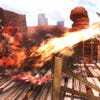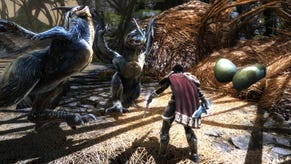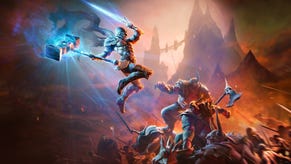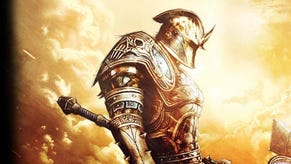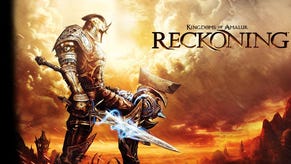Kingdoms of Amalur Preview: Action Speaks Louder
How to sell a fantasy epic, post-Skyrim? With combat that doesn't suck.
Kingdoms of Amalur: Reckoning. It's an instantly forgettable title. And it's not just meaningless and profoundly generic, it's saddled (like Dragon Age: Origins before it) with the exhausting suggestion that this isn't the birth of an exciting fantasy universe so much as the launch of a new franchising opportunity.
Having spent 15 hours or so in the company of a near-finished preview build of 38 Studios' brisk role-player - out next week - I can confirm that it deserves much better than this limp nomenclature. And yet, it's true that the title fits it like a glove.
'Kingdoms of Amalur': the game's universe is exactly the derivative mishmash of worn high fantasy tropes that you expect after reading those three words. It's been rubber-stamped by some big-name creatives (fantasy author RA Salvatore and comic and toy king Todd MacFarlane), and I suppose it's possible that "every building, tree and creature has a clear and defined history within this immersive world," as the literature claims. But this land of elves (sorry, Fae), dwarves and men initially offers nothing to distinguish itself beyond a similarity to Blizzard's Warcraft that's not so much striking as actionable. (I could swear that I met the Night Elf druid from the original WOW trailer. She even had the same clothes on.)
'Reckoning': if this subtitle makes you think of a violent console action game saturated with acrobatic combos, murder gauges and gory slow-motion execution moves, you're right again. In game design terms, Amalur's principal departure from the BioWare and Bethesda games that loom so large over it is a punchy, brawling combat style, ideally suited for a game pad.
But before you tar it with the dumbed-down brush, consider that Amalur never pretended to be a spiritual successor to Baldur's Gate - or anything else, for that matter. It's got all the branching conversations and skill trees you could want, but this taut and immediate action (along with its colourful artwork) sets it apart from its American RPG peers: games that, for all their qualities, can be dour and mechanically clumsy. Amalur, by contrast, is bright-eyed, bushy-tailed and slick as you like.
Amalur's development at Big Huge Games - which was owned by THQ for a spell before being incorporated into 38 Studios, an ambitious company owned by MMO enthusiast and former baseball star Curt Schilling - has been led by Ian Frazier (Titan Quest) and Ken Rolston, an Elder Scrolls veteran who was lead designer of both Morrowind and Oblivion. It's not exactly a pretender to Skyrim's throne, however.
The game unfolds in a more structured, less naturalistic or open-ended manner than an Elder Scrolls; its very large open world is made up of quite neatly defined and thematically discrete play fields, connected by disguised corridors. Game flow is clearly more important than total freedom to Big Huge Games, and the same is true of its approach to storytelling.
There's certainly a wealth of narrative detail and background lore here, and quests are framed in a familiar style, with conversation options and talking-head exposition. But fans of BioWare's intricate interactive fictions (regular and observant readers will know I don't really count myself among them) might be disappointed. Meaningful choices or forks in the tale are rare (making a lot of the dialogue redundant, it has to be said), and progress through the game is defined less by story than it is by exploration.
Your main quest and a choice of faction quests lead you from one location to the next, with a starburst of optional side-quests around each hub. Recovering WOW addicts like yours truly will find themselves soothed by the structure of this particular offline methadone. (It also bears comparison to Wii gem Xenoblade Chronicles.) Quick travel and a very detailed map keep things manageable, but while this certainly feels more like a video game than an untamed wilderness, it's not without a sense of scale and adventure - and, pleasingly, there are plenty of secrets to find.
Most of these secrets yield loot. Kingdoms of Amalur is a joyously loot-happy game - not quite a Diablo but close - and rightly unconcerned about showering a solo role-player in treasures. Chances are you'll be wearing something with a purple name and more stat boosts and status effects than you know what to do with in your first half-dozen hours, and you'll have superseded it just as quickly.
I haven't delved deep enough to judge Amalur's story yet; suffice to say that your character is a resurrected warrior with no memory (like most RPGs, Amalur assumes you want all your points invested in Amnesia from the get-go) who attracts the attention of a band of seers called the Fateweavers as well as an antagonistic, warlike tribe of Fae. In this world, everyone - especially the story-obsessed Fae, who constantly re-enact their fabled songs - believes their fate to be written in advance. So your ability to decide your own fate (and others') is both alarming and precious.
It's a cute conceit for a medieval fantasy game, although it's hard to tell if the rather functional writing will have the grace to handle it when the going gets tough and the choices start to matter. It's also tied, with varying degrees of success, to your character development and the mechanics of combat.
Character development, like so much in this game, is a pleasant balance of freedom and definition. There are three simple 'Destiny' archetypes (mage, rogue and warrior) but at each level-up you're free to invest points as you desire across these three skill trees. You can specialise one path or create your own hybrid quite easily, and at certain points you'll be rewarded with bonuses appropriate to your particular combination of Destinies. If you get bored, it's possible to pay a Fateweaver to unlock your Destiny, and reinvest all your points in a completely different build.
Active skills take the form of new weapon-attack combos or special skills that can be attributed to one of four trigger-plus-button slots. Combined with the basic controls - shield block, dodge and primary and secondary weapon attacks - you get a simple, responsive, flexible and fun combat system. Enemies are pretty easy to down with combos, but when they hit, they hit hard - and with no recharging health, you'd better have some potions at the ready.
The most inelegant graft from console beat-'em-ups is the Reckoning meter, which charges with the bonus Fate you earn in combat (you get more Fate for more varied and effective use of your abilities). Fill this and you can enter a 'bullet time'-style frenzy, aiming to reduce as many enemies as possible to minimum health before the meter drains. Then you can "unravel their Fates" by executing them all in a single blood-spattered climax. It works, and it's useful in busy fights (Amalur likes to throw large, mixed enemy groupings at you). But it feels like an egregious inclusion in what is otherwise a sensitive and seamless mix of stat-crunching and free-flowing action combat.
With Skyrim's long shadow extending well into the early part of this year - and with only muted support from publisher EA, which is more invested in BioWare's work - Kingdoms of Amalur might prove a hard sell to sated fantasy enthusiasts. That title and the game's rather forced, generic personality don't help.
But initial impressions are of a game that's very nicely put together and hard to put down, with a refreshingly direct approach to putting pulse-raising action into a trad role-playing epic. Check our review next week to find out if the promise is fulfilled.




